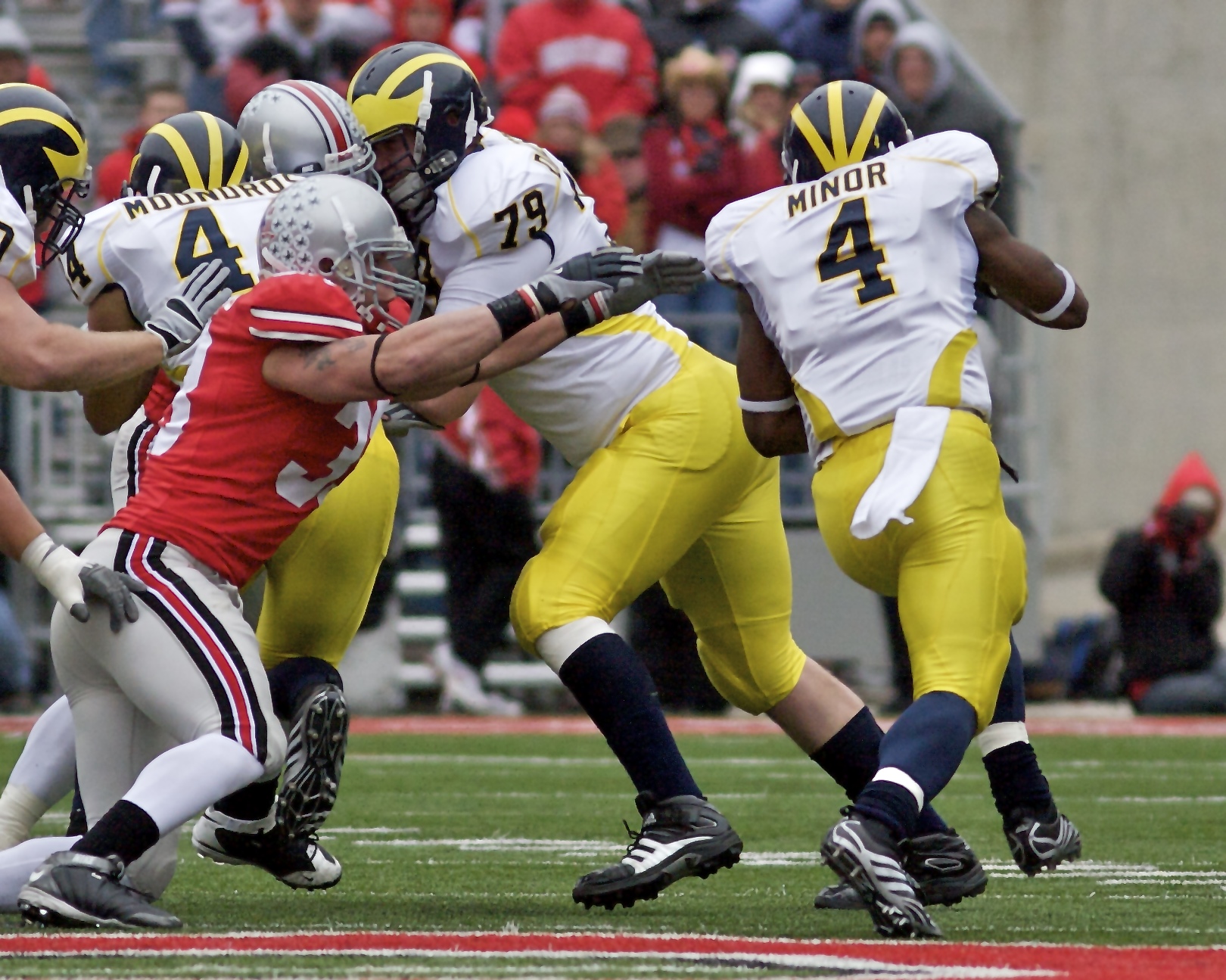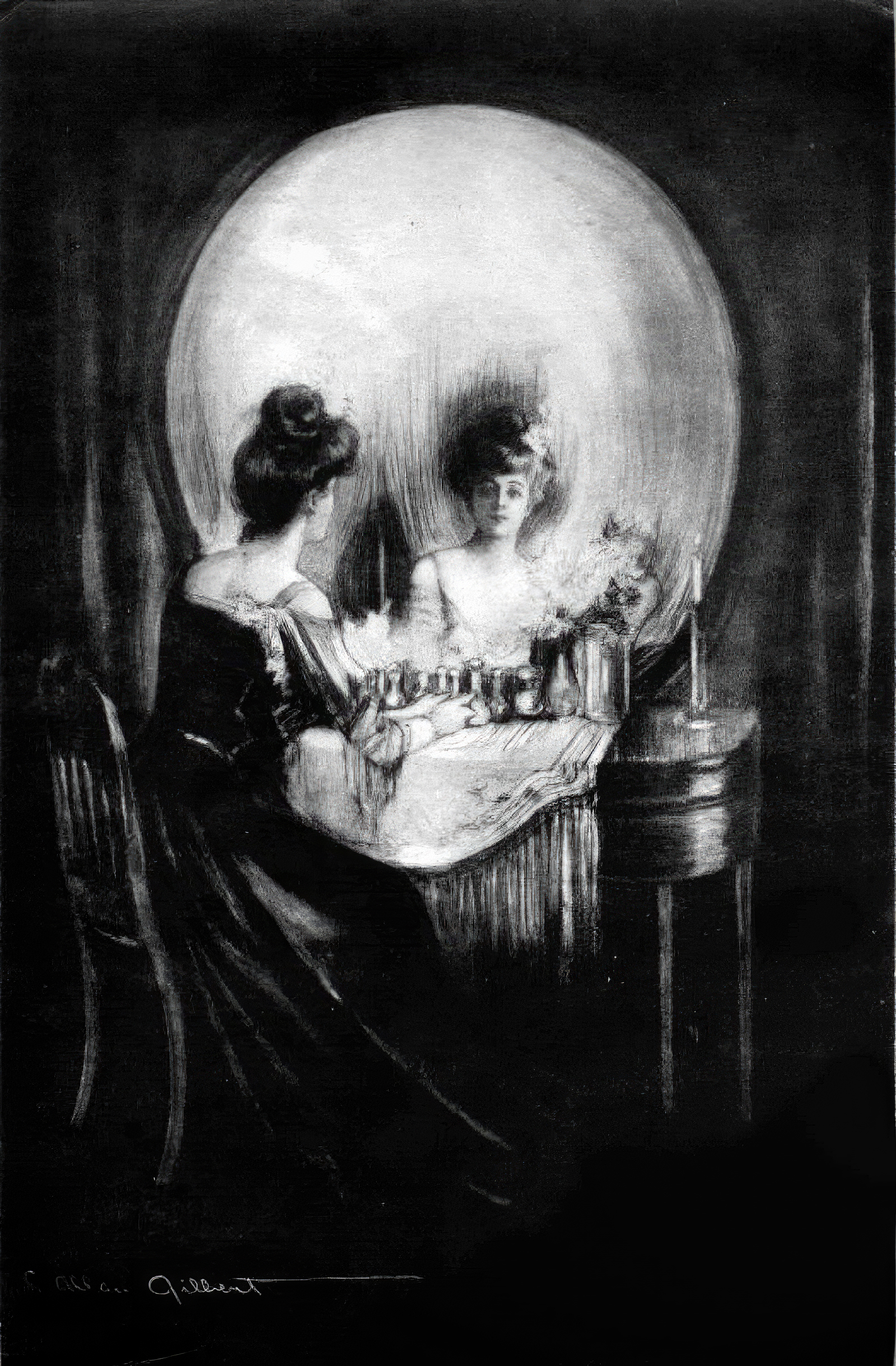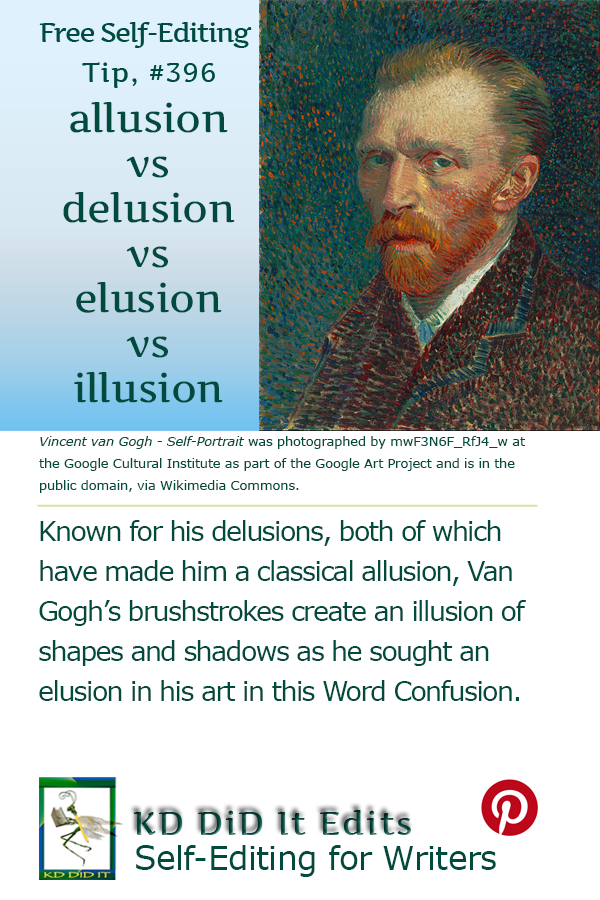I got so confused when I read this confusion of allusion with illusion in a story. I mean, I realize that gods and goddesses are myths once used to explain how the world works, but I never thought that Demeter helping the crops to grow was an illusion. It’s not like a goddess actually ghosted into the fields and started strewing manure around. I suspect the author was alluding to the concept of a fertility goddess.
12 September 2016: Delusion popped up on my radar, and it made sense to add it as a confusion since it also deals with illusions.
14 July 2017: Elusion turns out to be a word as well . . .
Allusion
Continuing the god/goddess example, referring to someone as a Mars among men would allude to his warlike tendencies. Another might refer to Neptune sending storms and I would understand that this meant storms at sea while a bit of text that said she was a Venus would tell me that the woman was a beauty.
Phrases that allude can include: 15 minutes of fame, the City of Angels, a rose by any other name have been used to refer to more than one Juliet, the Big Apple, and so many more. Short phrases that convey a whole wealth of meaning.
In literature, “allusion is distinguished from such devices as direct quote and imitation or parody. Most allusions are based on the assumption that there is a body of knowledge that is shared by the author and the reader and that therefore the reader will understand the author’s referent. Allusions to biblical figures and figures from classical mythology are common in Western literature for this reason. . . . Similarly, an allusion can be used as a straightforward device to enhance the text by providing further meaning, but it can also be used in a more complex sense to make an ironic comment on one thing by comparing it to something that is dissimilar (Encyclopædia Britannica).”
Delusion
Delusions are a mental illusion, a problem in the brain, a persistent false belief within the context of a neurological or psychiatric disease. They are frequently used in diagnosing certain psychotic disorders, such as schizophrenia, paraphrenia, manic episodes of bipolar disorder, and psychotic depression.
Elusion
An elusion is the act of evading, whether it’s escaping capture, hiding from someone or something, or mocking another. Think of your cat’s elusion when it’s time for them to go to the vet!
Illusion
Illusions are generally more physical such as the tricks performed by magicians like Harry Houdini, David Copperfield, or Sigfried & Roy. Think of all the optical illusions out there from the geometric designs that create the appearance of perspective or designs within designs, color blindness tests, the use of shadow and perspective by artists to create an object that is three-dimensional in appearance, ghost images that appear when you’ve looked at certain images for too long, etc., etc.
In a different arena, an ugly woman using make-up to provide the illusion of beauty will find that impression wash off in the morning whereas a guy who has stuffed a sock down his jeans will find that illusion revealed when the zipper comes down — before morning.
Exploring Later . . .
You may also want to explore the post, “Allusive vs Delusive vs Elusive vs Illusive” and/or “Allude versus Refer“.
They’re also homonyms.
Word Confusions . . .
. . . started as my way of dealing with a professional frustration with properly spelled words that were out of context in manuscripts I was editing as well as books I was reviewing. It evolved into a sharing of information with y’all. I’m hoping you’ll share with us words that have been a bête noire for you from either end.
If you found this post on “Allusion vs Delusion vs Elusion vs Illusion” interesting, consider subscribing to KD Did It, if you’d like to track this post for future updates.
| Allusion | Delusion | Elusion | Illusion |
|---|---|---|---|
 — |
 — |
 — |
 — |
| Part of Grammar: | |||
| Noun
Plural: allusions |
Noun
Plural: delusions |
Noun
Plural: elusions |
Noun
Plural: illusions |
| An expression designed to call something to mind without mentioning it explicitly
An indirect or passing reference to a person, event, or thing or to a part of another text
|
An idiosyncratic belief or impression that is firmly maintained despite being contradicted by what is generally accepted as reality or rational argument, typically a symptom of mental disorder
|
The act of evading or escaping from a danger
Evasion |
False idea or belief
[Psychology] A perception, as of visual stimuli (optical illusion) that represents what is perceived in a way different from the way it is in reality A very thin, delicate tulle of silk or nylon having a cobwebbed appearance, for trimmings, veilings, and the like [Obsolete] The act of deceiving
|
| Examples: | |||
| ‘Twas an allusion to Shakespeare that fell badly.
The phrase Trojan horse provides a shortcut for writers using it as an allusion for the trick employed by the Greeks against the people of Troy. |
He was under the delusion that he was being watched.
What a capacity television has for delusion. He was rather known for his delusions of grandeur. |
“I said it was, and done in defiance and by elusion of the law” (Allies).
“The game of challenge and elusion on her part, of perpetual and ever more ardent advance on his” (Woodrow). He practiced the most artful elusion of the worst work assignments. |
He had no illusions about the trouble she was in.
They presented the illusion of family togetherness. The tension between illusion and reality was getting thinner. Zollner’s illusion makes parallel lines seem to diverge by placing them on a zigzag-striped background. She chose illusion fabric for her veil. Turned out it was an optical illusion. Phew. |
| Derivatives: | |||
| Noun: preallusion Verb: allude |
Adjective: delusionary, delusive, delusory Adverb: delusively Noun: delusiveness, predelusion Verb: delude |
Adjective: elusive,elusory Adverb: elusively Noun: elusiveness Verb: elude |
Adjective: illusionary, illusional, illusioned Verb: illude |
| History of the Word: | |||
| Mid-16th century denoting a pun, metaphor, or parable, playing on words. From the late Latin |
Late Middle English, in the sense of act of deluding or of being deluded is from the late Latin delusio(n-), from the verb deludere. | 1540s as a noun of action from elude, or from the Medieval Latin elusionem (a nominative elusio), which is a noun of action from the past participle stem of the Latin eludere. | From Middle English in the sense of deceiving, deception via the Old French from the Latin illusio(n-); from illudere meaning to mock, from in- (against) + ludere (play). |
C’mon, get it out of your system, bitch, whine, moan . . . which words are your pet peeves? Also, please note that I try to be as accurate as I can, but mistakes happen or I miss something. Email me if you find errors, so I can fix them . . . and we’ll all benefit!
Satisfy your curiosity about other Word Confusions on its homepage or more generally explore the index of self-editing posts. You may also want to explore Book Layout & Formatting Ideas, Formatting Tips, Grammar Explanations, Linguistics, Publishing Tips, the Properly Punctuated, Writing Ideas and Resources, and Working Your Website.
Resources for Allusion vs Delusion vs Elusion vs Illusion
Some of these links may be affiliate links, and I will earn a small percentage, if you should buy it. It does not affect the price you pay.
Allies, T.W. Journal in France in 1845 and 1848 with Letters from Italy in 1847. DigiCat, 2022. Originally published in 1849. <https://amzn.to/3TmueN5>.
Apple Dictionary.com
Dictionary.com: elusion
Stahl, Dawn McIlvain. “‘Lude’ Word Tricks: Allude, Delude, Elude, Illude” ACES News. 1 Jan 2019. Web. 18 Oct 2019. <https://aceseditors.org/news/2019/lude-word-tricks-allude-delude-elude-illude>.
Woodrow, Mrs Wilson. The Black Pearl. DigiCat, 2022. It was originally published in 1912. <https://amzn.to/3CLioFg>.
Pinterest Photo Credits:
Vincent van Gogh – Self-Portrait was photographed by mwF3N6F_RfJ4_w at the Google Cultural Institute as part of the Google Art Project and is in the public domain, via Wikimedia Commons.
Revised as of 20 Oct 2022
By: Kathy Davie

